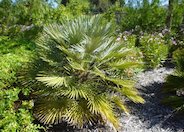
Common name:Scarlet Trumpet Vine
Botanical name:Distictis buccinatoria
This evergreen vine is highlighted by large, blood red, trumpet-shaped flowers with a yellow throat. These flowers will continue to appear throughout the warm months.

Common name:Mediterranean Fan palm
Botanical name:Chamaerops humilis
Slow growing to 20' tall but very hardy, the Mediterranean Fan palm is clump forming with rich green foliage. It can be used as a good container subject. It does best in full sun or partial shade. Petioles have sharp spines.

Common name:New Zealand Flax
Botanical name:Phormium tenax
New Zealand Flax is a large, bold plant with stiffly vertical, sword-like, green leaves that arise from its base. It should be grown under full sun for best color. Varieties will offer different growth habits and leaf color.

Common name:Pink Mexican Evening Primrose
Botanical name:Oenothera speciosa 'Rosea'
Oenothera speciosa 'Rosea' is a perennial groundcover. It grows 10"-12" high, with profuse showing of 1.5" wide rose pink blooms in summer. Flowers open in daytime and stems die back after bloom. It can be highly invasive.

Common name:Mexican Bush Sage, Velvet Sage
Botanical name:Salvia leucantha
The Mexican Sage is a bushy shrub that grows 3'-4' tall and wide. It has hairy white stems, gray green leaves and velvet-like purple flower spikes that bloom summer through fall. This shrub tolerates sun, light shade, little water, and is hardy to 15 degrees F. The Mexican Sage is drought tolerant and attracts hummingbirds. -Cornflower Farms

Common name:Butterfly-Iris, Fortnight Lily
Botanical name:Dietes iridioides
This clumping evergreen Iris bears tall, narrow leaves to 30" tall and white flowers marked purple in the center on stalks up to 3' tall. This variety has stiffer, darker foliage than the bicolor form. It requires sun to part shade with little or no summer watering when established. -Monterey Bay Nursery

Common name:Commom Yarrow
Botanical name:Achillea millefolium
This Achillea features spreading mats of fern-like rosettes, along with deeply divided leaves of a green or gray green color. In this form, the flowers are usually a white tone. Stems can reach 2'-3' above foliage. Yarrows propagate easily from rooted cuttings or division, which should be performed in the early spring or fall. Following bloom, one should dead head the plant and divide the clumps when it appears crowded.

Common name:Hybrid Gazanias
Botanical name:Gazania hybrids
These ground covers will grow less than 1' tall and have medium size, gray green leaves with gold, lavender, orange, red, yellow, or white flowers that are present all year.

Common name:Hybrid Tea Rose (selections)
Botanical name:Rosa Hybrid Tea varieties
These shrubs and vines are the most loved in the Western USA and are very resilient. They come in a wide variety of sizes and colors and are easy to maintain with proper care. They can be used in a water-conserving garden with careful attention to irrigation practices.

Common name:Freeway Daisy, Trailing African Dai
Botanical name:Osteospermum fruticosum
This groundcover will grow 1'-3' tall and has medium-sized, green leaves with purple or blue flowers that can bloom all year.
Designer: Unknown
Photographer: GardenSoft
Practice grass-cycling by leaving short grass clippings on lawns after mowing, so that nutrients and organic matter are returned to the soil.
Mulching and adding compost to soil can minimize evaporation and help soil absorb and store water.
Drip and other smart irrigation delivers water directly to roots, allowing no excess water for weeds.